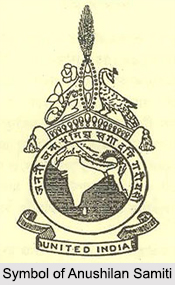 Operating in the first quarter of the 20th century, the Anushilan Samiti was one of the secret revolutionary organisations during the freedom struggle. The purpose of the Samiti was to propound revolutionary violence as a means to end British colonialism in India. Established in the year 1902 by Pramathanath Mitra, a barrister from erstwhile Calcutta, the Anushilan Samiti arose from a conglomeration of local youth groups and "akhara" or gyms in Bengal.
Operating in the first quarter of the 20th century, the Anushilan Samiti was one of the secret revolutionary organisations during the freedom struggle. The purpose of the Samiti was to propound revolutionary violence as a means to end British colonialism in India. Established in the year 1902 by Pramathanath Mitra, a barrister from erstwhile Calcutta, the Anushilan Samiti arose from a conglomeration of local youth groups and "akhara" or gyms in Bengal.
Origin of Anushilan Samiti
In the initial years after the establishment, the Anushilan Samiti failed to make any significant impact but continued to challenge the British rule in India by engaging in militant nationalism, like bombings, assassinations, and politically motivated violence. The Samiti had two prominent and somewhat independent arms in the East and West Bengal identified as the Dhaka Anushilan Samiti centred in modern day Bangladesh and the Jugantar group, situated in erstwhile Calcutta.
By 1902, Calcutta had three societies working under the umbrella of Anushilan Samity. One was founded by the erstwhile Calcutta student, Satish Chandra Basu under the patronage of barrister Pramathanath Mitra. The other society was led by the Indian feminist and activist, Sarala Devi and the third was founded by Jatindranath Banerjee and Aurobindo Ghosh.
Structure of Anushilan Samiti
Strongly influenced by Shakta Philosophy of Hinduism, the Anushilan Samiti was also inspired by European ideologies, Pan- Asianism and the works of prominent figures like Sister Nivedita and the Japanese artist Kakuzo Okakura. But during the late 1930s, a major section of the Anushilan movement had been attracted to Marxism.
The Anushilan Samiti was centrally organised, with a rigid discipline and vertical hierarchy. Initially, the membership was predominantly Hindus and each of the members was assigned to three or more roles, which included collection of funds, implementation of planned action and propaganda. But as the Samiti spread its influence to other parts, especially north India, it began to draw people of other religions and of varying religious commitments.
Members of Anushilan Samiti
The members of Anushilan Samiti were primarily school and college students who belonged to the Hindu Bhadralok or the upper class Bengali households. The Anushilan Samiti members raised funds for their revolutionary attempt by despoiling the houses of people who were loyal to the Raj. In 1913, the Barisal Conspiracy case came forth and became famous as it imprinted the fact that in Barisal district alone there were hundreds of revolutionary followers of the Samiti. The relation between the Dhaka Anushilan Samiti and the Jugantar group became very narrow before the First World War as it brought the opportunity for the Bengali militants to conflate into united movements. The Jugantar group again rose as a confederation of revolutionary cells throughout the country.
Some of the notable members of Calcutta Anushilan Samiti were Jatindranath Mukherjee or Bagha Jatin, Rash Behari Bose, Taraknath Das, Nanigopal Sengupta, Hemendrakishore Acharya Chaudhuri, Narendra Bhattacharya or M.N. Roy, Atulkrishna Ghosh, Amarendra Nath Chatterjee, Jadugopal Mukherjee and Bhavabhushan Mitra.
Other than these, few of the other members of the Anushilan Samiti were Bipin Behari Ganguli, Purnachandra Das, Nolinikanta Kar, Bhupendra Kumar Datta, Bhupati Majumdar, Surendra Mohan Ghosh or Madhu Ghosh, Satish Chandra Mukherjee or Swami Prajnanananda, Debabrata Bose, and later came Swami Pragyananda and Ullaskar Dutta.
Impact of Anushilan Samiti
With their revolutionary nationalism, the Anushilan Samiti greatly impacted the Indian freedom struggle by making a stand against the various unethical laws and Acts passed by the British. Few of these acts include the police reforms that were implemented by the Secretary of State, Sir Harold Stuart to fight the menace posed by the Samiti. Other such reforms that the Anushilan Samiti made a stand against was the Criminal Law Amendment of 1908, the Defence of India Act 1915, the Rowlatt Act and the Bengal Criminal Law Amendment, etc. The Anushilan Samiti was also partly responsible for the influence of communism in India.
`



















